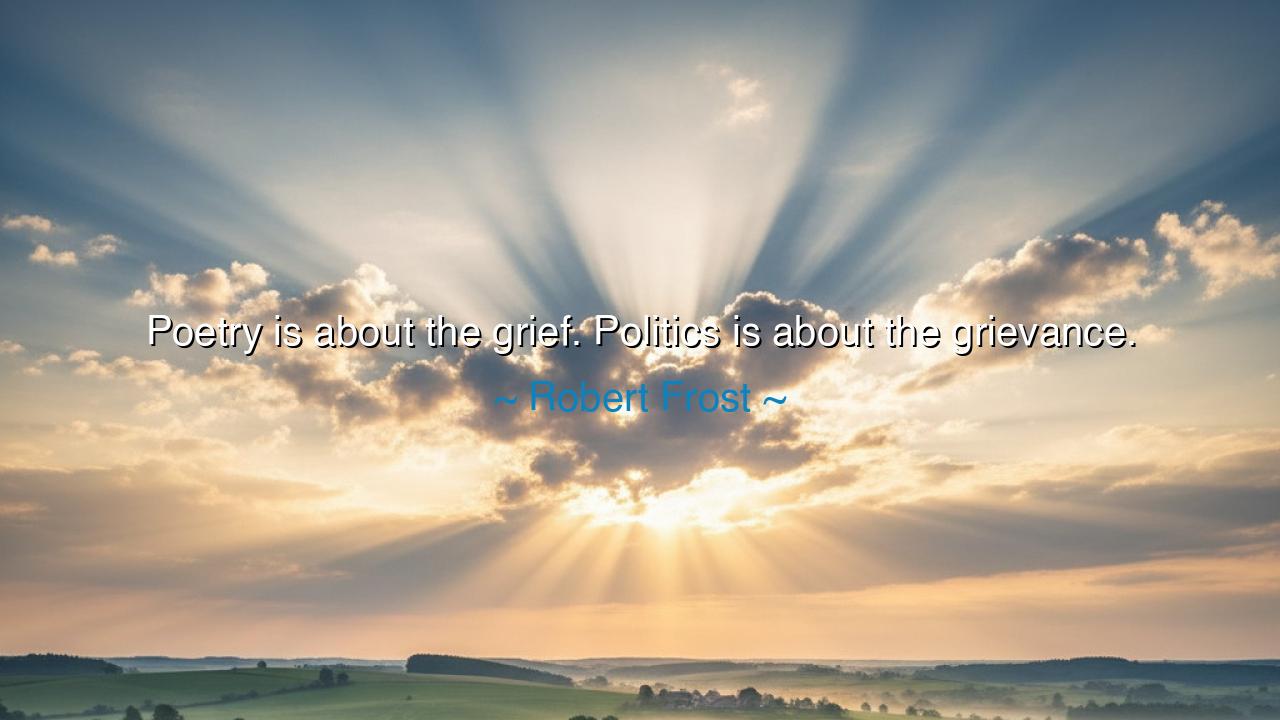
Poetry is about the grief. Politics is about the grievance.






Hear, O seekers of wisdom, the solemn words of Robert Frost, who declared: “Poetry is about the grief. Politics is about the grievance.” In this saying, he divides two realms that often overlap yet remain profoundly different. Poetry turns inward, to the sorrow of the soul, to the unmeasured weight of suffering that belongs to all humanity. Politics, by contrast, turns outward, to the quarrel, the demand, the claim of injury against another. One is timeless and universal, the other immediate and partisan. Both spring from pain, yet one seeks meaning, while the other seeks redress.
For grief is not a weapon but a wound. It belongs to every man and woman, rich or poor, saint or sinner. When the poet writes, he does not accuse the world, he confesses the sorrow of being human. The poetry of grief speaks to death, to longing, to the loss of love, to the fragility of existence. It is sorrow purified into art, not to blame, but to reveal. In grief we recognize one another, for none can escape it; it is the universal inheritance of the mortal.
By contrast, grievance is grief turned outward, sharpened into accusation. It says: This wrong was done to me; this must be corrected; someone must be held accountable. Politics thrives upon grievances, for its very engine is the struggle over justice, power, and reparation. Grievance is necessary in the world of law and governance, for without it the injured would remain unheard. Yet Frost warns us that politics and poetry, though born of similar soil, aim at different fruits: politics seeks resolution of grievances, poetry seeks expression of grief.
Consider the poets of the Great War. Wilfred Owen wrote not with grievance, not to demand vengeance, but with grief for the young men broken in body and spirit. His poetry transcended politics, for it did not ask who was guilty, but asked what it means to suffer, to die, to lose youth to horror. By contrast, politicians of the same war thundered grievances against enemy nations, demanding justice or conquest. Both voices arose from the battlefield, yet one sought to console the soul, the other to rally the state.
Or think of Abraham Lincoln, who in his politics carried grievances of a divided nation, yet in his words often rose to poetry, speaking of grief. In the Gettysburg Address, he did not accuse, but mourned: “We cannot dedicate, we cannot consecrate, we cannot hallow this ground.” Here he spoke as poet, and it is this voice that endured beyond his politics. His grievances belonged to his age; his grief belongs to eternity.
Frost’s wisdom, then, is not to pit poetry against politics, but to remind us of their true domains. The danger lies in confusing them. When poetry becomes grievance, it shrinks into propaganda. When politics pretends to speak only grief, it disguises power as pity. Each has its sacred place: let politics deal with the grievances of society, and let poetry reveal the grief that unites us all.
Therefore, O children of tomorrow, learn this lesson: do not mistake your grievances for grief, nor your grief for grievance. When you suffer a wrong, speak it plainly in the realm of politics, and seek justice. But when you suffer the deeper sorrows of life—loss, longing, mortality—turn to poetry, whether written by you or by another, for there you will find not remedy, but recognition. Both are necessary, but their purposes differ.
So remember Frost’s wisdom: poetry is about the grief, eternal and unchanging, while politics is about the grievance, urgent and passing. Cherish both, but do not confuse them. For poetry heals the soul by naming its sorrow, and politics heals the world by addressing its wrongs. One gives us meaning, the other seeks us justice—and together they guide us through the struggles of life.






HTNguyen Hai Thuy
I love how Frost captures the moral difference between feeling and using feeling. Grief is something endured, transformed, and shared through poetry. Grievance, on the other hand, is something projected outward, demanding blame. I wonder if Frost believed that poetry could protect us from becoming too political in our pain. Maybe he saw art as a way to turn suffering into wisdom rather than bitterness.
TDTa Tien Dat
This line makes me reflect on how emotion is used differently in art and politics. Grief in poetry invites compassion—it’s introspective, healing. But grievance in politics weaponizes pain to gain power. I think Frost is warning us about what happens when emotion leaves the realm of art and enters the arena of manipulation. It’s a reminder that sincerity and exploitation can look dangerously similar.
NQNhat Quang
I find this contrast fascinating. Frost seems to be saying that poetry turns pain into understanding, while politics turns pain into accusation. It makes me think about how both stem from human suffering but take such opposite paths. Is he implying that poetry is the more honest response to loss? Or that politics corrupts what poetry seeks to redeem? It’s such a concise but powerful distinction.
VDPham van dong
This quote hits me as profoundly insightful. Frost draws a sharp line between inner sorrow and public outrage—between the personal and the political. Grief feels universal, something that connects us quietly, while grievance divides and demands attention. I wonder if he’s suggesting that poetry heals through empathy, while politics thrives on conflict. Can the two ever coexist, or must art and power always speak in different emotional languages?